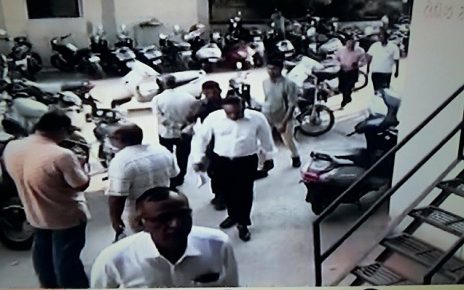The hearing for the 2002 post-Godhra riots case of Gulbarg Society, in which 69 persons including former Congress MP Ehsan Jafri were killed, is underway. 11 accused have been convicted so far for the murder and 13 more have been convicted under other charges. According to reports, the sentencing will be announced on 6 June. According to sources the judge said that charges against the BJP corporator were inconclusive. Bipin Patel, a sitting BJP corporator from the Asarwa area, was charged with murder and rioting like the other 65 people who stood trial. Mr Patel, was the corporator in 2002 too and has won multiple elections since. The verdict comes 14 years after a mob of nearly 20,000 attacked Gulbarg society – a cluster of 29 bungalows and 10 apartment buildings housing mostly Muslims – killing 69 people, including former Congress lawmaker Ehsan Jafri.
The rioters had breached the boundary wall of the housing complex and set houses afire. Ehsan Jafri was dragged out, hacked and burnt to death along with 68 others. His frantic phone calls to police officers and senior politicians for help allegedly went unanswered. The rioters had breached the boundary wall of the housing complex and set houses afire. Ehsan Jafri was dragged out, hacked and burnt to death along with 68 others. His frantic phone calls to police officers and senior politicians for help allegedly went unanswered. Mr Jafri’s wife, Zakiya Jafri, now 77, has pursued justice through the years despite failing health and has said she wants the death sentence for the killers of her husband.PTI had earlier reported that Special Court judge PB Desai will deliver the judgment over eight months after the trial concluded on 22 September, 2015. Ahmedabad has been put on high alert for the same.
The Supreme Court, which is monitoring the case, had directed the SIT court to give its verdict by 31 May. There are 66 accused named by the SIT in the case for the murder of 69 people. Nine of the accused are behind bars since 14 years, while others are out on bail. Survivors of the 2002 Gujarat riots weep inside a house that was burnt and damaged in the riots at the Gulbarg Society, a Muslim-dominated housing, during the commemoration of its 12th anniversary in the western Indian city of Ahmedabad February 28, 2014. The riots were some of the country’s worst religious riots since independence, killing some 2,500 people, mainly Muslims. Five have died during the trial among the 66 accused, which has been conducted under four judges. The Times of India added that over 338 witnesses were examined in the case, and is the only one where then Gujarat Chief Minister Narendra Modi had been questioned. One of the accused, Bipin Patel is a sitting BJP corporator from Asarva seat. He was also the corporator in 2002 when the massacre happened and won the election for fourth consecutive term last year.
Last week, the court had turned down pleas moved by two accused — Narayan Tank and Babu Rathod — to conduct narco analysis and brain mapping tests on them to prove their innocence. The court maintained that it was not required when the verdict was imminent. During the trial, riots victim’s lawyer had argued that the massacre was a pre-planned criminal conspiracy hatched by the accused to kill minority community members of the Gulbarg Society. The defence had refuted the conspiracy theory of prosecution and claimed that the mob resorted to violence only after slain Congress MP Ehsan Jafri fired several rounds on them. The Gulbarg Society case is the eighth of the nine cases of the 2002 Gujarat riots probed by the Supreme Court appointed SIT. A Hindu mob had attacked the muslim neighbourhood Gulbarg Society in Chamanpura, Ahmedabad on 28 February 2002 and burned down houses. Many were burned alive, and the total death toll was 69. The incident had taken place a day after S-6 coach of Sabarmati Express was burnt near Godhra train station, where in 58 ‘karsevaks’ were killed.





